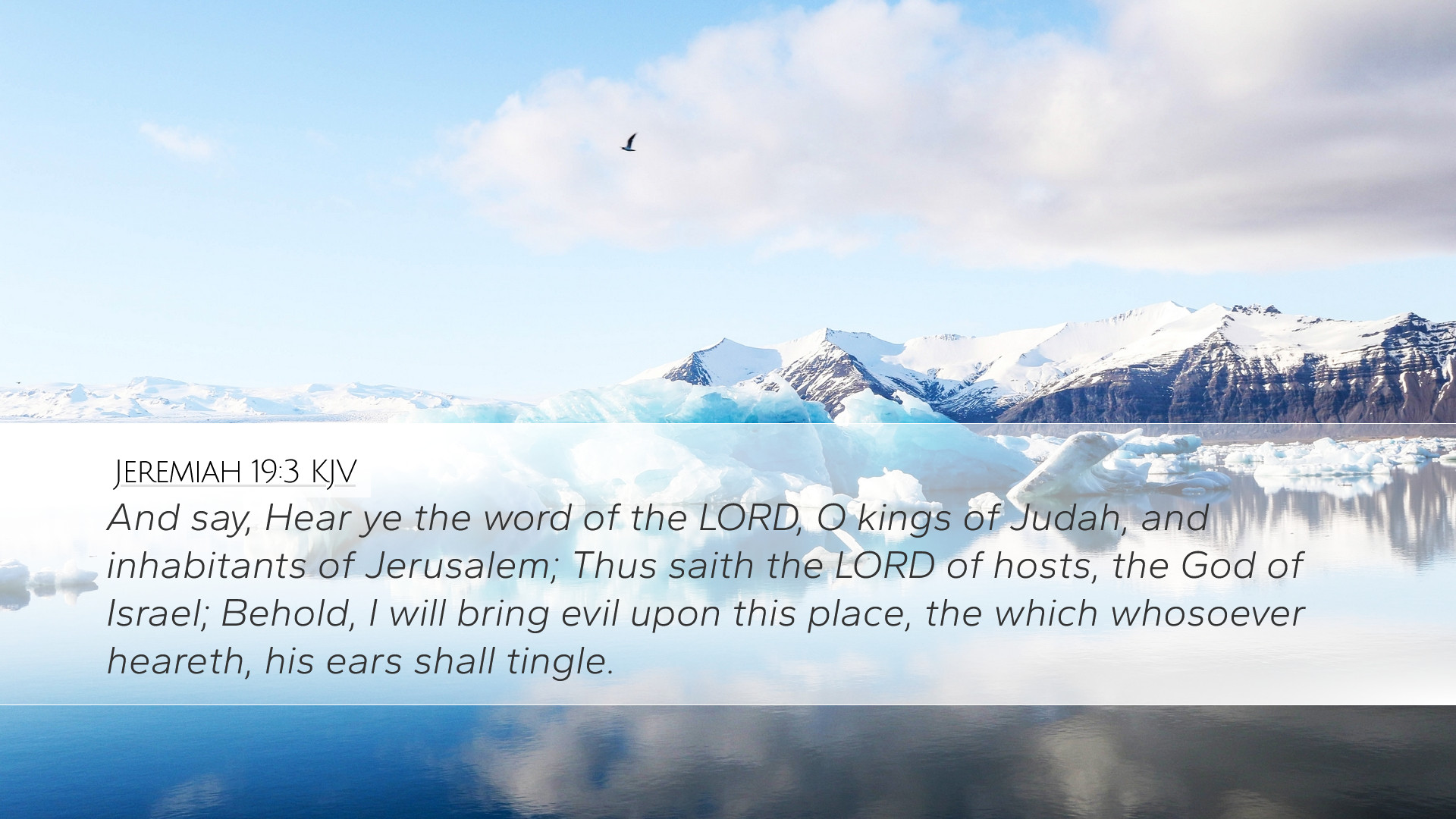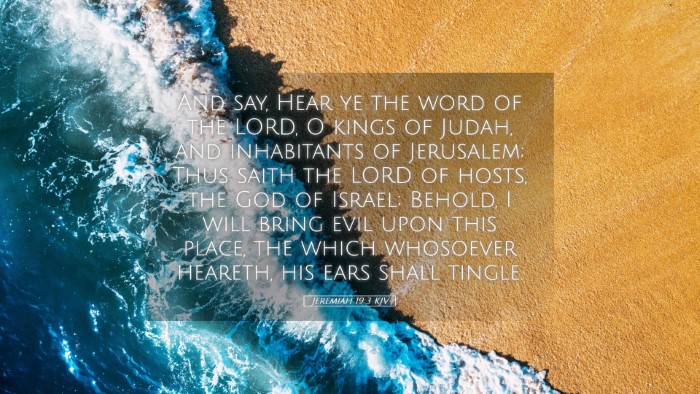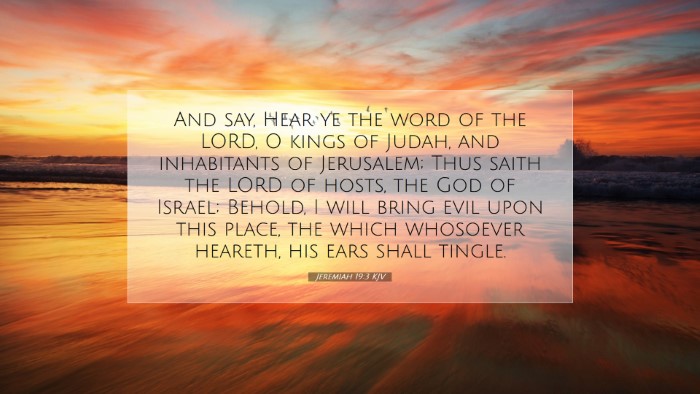Commentary on Jeremiah 19:3
Verse Reference: Jeremiah 19:3 - "And say, 'Hear the word of the Lord, O kings of Judah and inhabitants of Jerusalem! Thus says the Lord of hosts, the God of Israel: Behold, I am bringing such disaster upon this place that the ears of everyone who hears of it will tingle.'"
Introduction
This verse serves as a solemn declaration from God through the prophet Jeremiah regarding impending judgment. The Lord's message is directed at both political leaders and the general populace of Judah, emphasizing the seriousness of their situation due to their continued disobedience.
Contextual Analysis
The context of Jeremiah 19:3 is vital for understanding its implications. Jeremiah prophesied during a period of great moral decay and idolatry in Judah. The nation had strayed from the covenantal laws given by God, leading to a situation where divine wrath was imminent. Jeremiah's prophetic acts, including the breaking of a clay pot as a visual symbol of impending destruction, were meant to capture the attention of the people and their leaders.
Historical Background
The time frame of Jeremiah's ministry was around the last days of Judah before the Babylonian exile. The political landscape was turbulent as the nation grappled with external threats from Babylon and internal corruption. This warning served as a precursor to the calamity that would unfold, thus indicating the gravity of the divine revelation conveyed through Jeremiah.
Theological Insights
- The Word of the Lord: This phrase underscores the authority behind Jeremiah’s proclamation. It is the Lord of hosts—the supreme ruler of the universe—who speaks, thus demanding the attention of both kings and common people.
- Collective Responsibility: The dual audience of 'kings and inhabitants' illustrates that judgment is not merely for the leaders but for the entire community. The leaders are held accountable for guiding their people towards righteousness, while the citizens are called to heed the warning against the pervasive sinful practices.
- Disaster and Judgment: The impending disaster signifies not only physical destruction but spiritual separation from God’s favor. The use of “tingle” suggests an intense emotional reaction—anticipating that the news of destruction would evoke shock and fear among those who hear it.
Public Domain Commentary Insights
Matthew Henry's Commentary
Henry emphasizes the gravity of the Lord’s message, portraying the disaster as a consequence of the people’s transgressions. He details the centrality of idolatry and unfaithfulness in Jeremiah's lamentations and cautions that the people's hardened hearts are what subject them to such dire warnings. Henry notes that God’s warnings are acts of mercy, intended to draw the people back to repentance before it is too late.
Albert Barnes' Commentary
Barnes reflects on the implications of the phrase "hear the word of the Lord," suggesting it is an urgent call for attention and action. He elaborates on the significance of "tingling ears," indicating a reminder that the dire consequences of their actions evoke not only fear but also a necessary recognition of the covenant’s serious implications. Barnes calls attention to how the prophetic voice serves both as an announcement of impending disaster and a clarion call for humility and submission to God’s will.
Adam Clarke's Commentary
Clarke provides an extensive historical context and emphasizes the need for the inhabitants of Judah to understand the reasons for their plight. His analysis includes insights into the cultural practices of the time that led to divine ire. Clarke insists on the prophetic nature of the warning, suggesting that true understanding requires a recognition of God's holiness juxtaposed with human disobedience. He asserts that this verse serves not only as a prediction of calamity but as an invitation to rethink and reform their lives according to God’s precepts.
Application for Pastors and Leaders
This verse calls for introspection on leadership and spiritual guidance within congregations. Pastors are reminded of their role as voices of divine truth. Just as Jeremiah was tasked with proclaiming difficult messages, church leaders must embrace the whole counsel of God, which includes warnings against straying from spiritual integrity. Congregations are encouraged to cultivate an environment where hearing and responding to God’s word are paramount.
Conclusion
Jeremiah 19:3 is a poignant reminder of the seriousness of divine warnings. Both the leaders and the people of Judah were complacent in their spiritual condition, and through Jeremiah, God issued a clarion call to repentance. The insights from various public domain commentaries illuminate the enduring relevance of this verse today, reminding all believers of the necessity for attentiveness to God's word and the reality of consequences tied to collective disobedience. Ultimately, it serves as a powerful exhortation to embrace faithfulness, righteousness, and an ever-growing relationship with the Lord.


